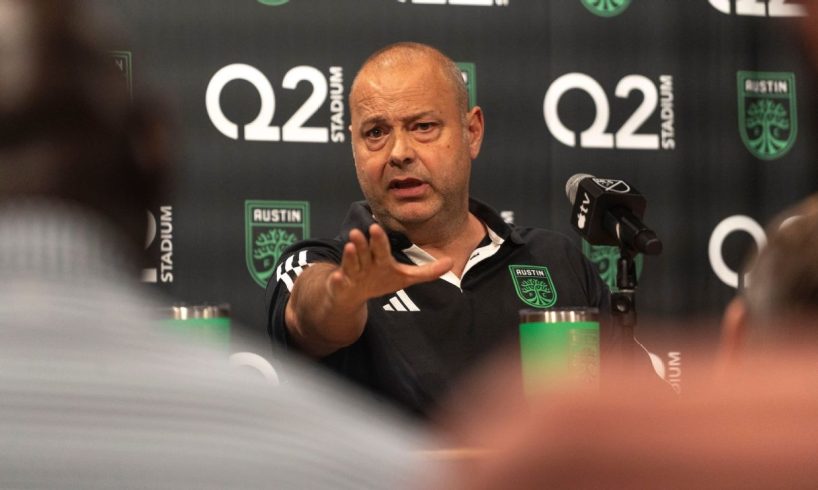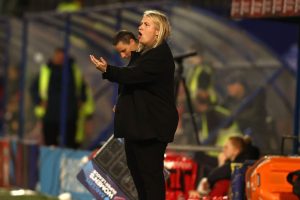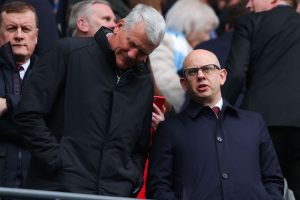
Jeff Carlisle, U.S. soccer correspondentJan 30, 2024, 10:36 AM ET
CloseJeff Carlisle covers MLS and the U.S. national team for ESPN FC.Rodolfo Borrell was hired as Austin FC sporting director in the summer of 2023. Kara Hawley/American-Statesman / USA TODAY NETWORK
In 2018, Rodolfo Borrell’s vision of what he could accomplish in U.S. soccer came into focus.
The Barcelona-born coach had already been following Major League Soccer for seven years, even as he concentrated on his day job at the time with Manchester City, assisting Pep Guardiola. He was intrigued by the potential of the sport in North America, and its top league in particular.
As such, Borrell was giving a clinic in New York City to a group of 13-year-olds. By his own admission, clinics are not exactly Borrell’s favorite activity, but over the course of four days, he was blown away by what he saw, especially in term of the players’ capacity to learn. “It was unbelievable,” he told ESPN. “I know it can sound crazy, but in four days of the clinic you’re taking a bunch of kids that are 13 years old — all American kids — and you could see that they could take on the information and [execute] the information, and it was amazing.”
The experience made Borrell think that if the U.S. soccer ecosystem could improve in a few key areas, then “the [U.S.] would be unstoppable soccer wise, as the country has shown it’s unstoppable in many other sports.” Last June, he took the next step in making that vision a reality, taking over as sporting director at Austin FC.
The job opening came at an opportune time. Man City had just won the treble of Premier League, FA Cup and UEFA Champions League titles, and unlike past opportunities in MLS, the offer came in the summer, when he could make a clean break. In the ensuing months, he’s made note of what’s encouraging as well as frustrating, but he remains energized about the challenge ahead.
Flaws in the system, but also opportunities
As Borrell sat down with ESPN on a gray November day, it’s clear the club is in offseason mode. The team’s training facility is relatively quiet, though work was being done. Manager Josh Wolff was spotted in the building, plotting his strategy for next season after missing the playoffs in 2023.
Borrell is hard at work as well, although he admits his willingness to discuss soccer-related matters is unlimited. “I like to talk,” he said. That is true for the aspects of the American game that he likes, as well as the ones he thinks need improving.
In terms of the former, he chafes at the notion that MLS is a retirement league, especially given the opportunities young players have both to break through and establish themselves. He feels there is immense potential in what is a vast and varied player pool, one rich with athleticism as well as the aforementioned ability to take on new concepts.
– Stream on ESPN+: LaLiga, Bundesliga, more (U.S.)
Talk of the flaws elicits a frown. Borrell isn’t quite a “stranger in a strange land” any more — he’d been in the U.S. for five months at the time of this interview — but he’s new enough to the country that he doesn’t want to come off as an insufferable know-it-all.
However, Borrell’s experience is so vast and deep that when he speaks, one is advised to listen. This is a man who coached at youth level for Barcelona during the time of Lionel Messi’s arrival. He also worked in Liverpool’s academy for five years, the last two of which were as the club’s academy director. That was followed by his nine-year stint with Manchester City, the last seven of which were spent at Guardiola’s side.
When asked where the U.S. needs to improve in terms of player development, he points to two areas: the quality of coaching at youth level, and the age when players begin specializing in soccer.
Currently, the youngest Austin FC academy side is U12 — most top European sides start at U6. Borrell is aware he’s up against some cultural hurdles. There is a desire for kids in the U.S. to start out playing several different sports and begin specializing later, but he still feels this needs to change.
“Technique is acquired at a very young age and the earlier you specialize, the better,” he said. “In some ways I understand this multicultural idea and multisport idea, but on the other hand, I think [it’s a disadvantage] against some other cultures.”
The six-year head start the U.S. is giving to its international rivals in terms of specialization amounts to “a huge difference,” he added.
Borrell said that the size of the U.S. works against it in some ways. He’s a big proponent of “the best playing against the best.” That was one of the mantras of the now-shuttered U.S. Soccer Federation Development Academy, and continues with MLS Next, but that is much easier to implement at all age levels in the U.K. — which is a third the size of Texas — than it is in the United States. Spain, where he was born and raised, is even smaller.
He admits that the idea of making 8-year-olds hop on a plane for a game is impractical for both financial and health reasons, so that means finding the best competition closer to home. Fortunately for Austin FC, there are two other academies with FC Dallas and the Houston Dynamo already in the state. He still feels that’s suboptimal.
Editor’s Picks
2 Related
Of greater concern is the level of coaching, which Borrell said “has to improve massively.” Increasing the quality will require a collaborative effort from the U.S. Soccer Federation, state associations and individual clubs, he said. The major pain point is the ability to communicate ideas and concepts to the players, while taking into account the ages with which a coach is dealing.
“Nowadays you can search on Google and find 10 million presentations. I’m not saying anybody can, but many people would be able to speak very well about the sport, or how to deliver a technical program or whatever,” he said. “The most important thing to me is not what you talk about, but what you’re going to deliver on the pitch.”
He’s also working against the idea that a good coach can handle any age group, because a coach adept at coaching U12s might not be as successful with a U-15 team. Borrell stressed that doesn’t mean the person isn’t a good coach — just that his or her relative strengths might work better for a particular age group.
“I think fitting the right profile of coach for each one of the age groups is key,” he said.
All of which has brought him to Austin FC. Borrell feels that there is plenty of knowledge that he picked up at La Masia, Barcelona’s famed academy, and elsewhere that can be applied in Austin. There is scouting and recruitment areas to bolster, coaches to be hired and spelling out the way the technical program will be delivered. But it starts with a game model that defines roles and players’ profiles.
When asked if that was missing before his arrival in Austin, he said, “I would say so.”
Borrell also stresses that the game model needs to reflect the city. He recalls that in Barcelona, it wasn’t enough to win, the team had to win well, playing an attractive style.
“If you win, but you don’t play the right way, you are bad. They’re going to boo you. They don’t care,” he said. “If you are thinking that you’re going to watch Barcelona to play long balls and kicking [opponents], ‘But no, but I’m winning,’ you’re going to be out of there. You’re going to get sacked because this doesn’t engage the people over there.”
Before his move to Austin, Rodolfo Borrell served as Pep Guardiola’s assistant at Manchester City for seven seasons. Domenic Aquilina/NurPhoto via Getty Images
To hear Borrell describe his preferred game model, it’s one that veers closer to Barcelona’s, and not just because he spent 14 years there. It has more to do with where he’s working and what appeals to fans in the area. Granted, this approach is espoused all over the world. The academy director who advocates for long-ball tactics has yet to be hired, but with Borrell, the words carry a bit more weight.
“This is a creative city — this is a city also with a lot of Latino influence,” he said about Austin. “Latinos are used to watching creative ways of playing. When you are looking at these kinds of things, you need to understand that a creative model, a creative way of playing is important. You need to take into consideration all these kinds of things.”
Given the way MLS academies have been increasing their exports to Europe, there is a sense that what Borrell is trying to create can be accomplished relatively quickly, though he stressed patience: Austin is just now entering its third season. “I think obviously from me there has to be a very clear direction on that, but it takes time,” he said. “It takes time and it takes finding the right professionals for each one of the areas and it takes coaching, education and development.”
‘I am the one who has to adapt’
As much as Borrell’s background is in youth development, there is also the first team to consider, and he admitted that his first months in Austin have been something of an education. That is especially true with regards to the arcane roster rules of MLS that govern the salary cap.
Those rules have long been viewed as punishing success and rewarding mediocrity, in that successful teams are often forced to move players that they very much would like to keep. Borrell acknowledged the tough choices that come with having a successful team in MLS, but noted that teams are also punished for making mistakes. It’s not necessarily easy to move players that don’t work out, and this prevents a team from making moves that would improve the roster.
Between the two, Borrell feels that the mistakes clubs make with players are punished more severely than success.
“At least when you get rid of the [successful] players you are able to increment your amount of General Allocation Money (GAM), and if you are incrementing your amount of GAM, then it’s when you become competitive within the national market,” he said. “So in the end you need to get it right with the Designated Players because the DPs, in theory, are the ones who are going to make the biggest difference. So first is this, and second you need to get it right with the national players as well, to be able to at some point trade them or sell them abroad and then to be able to reinvest.”
STREAM FUTBOL AMERICAS ON ESPN+
Herculez Gomez and Sebastian Salazar debate the biggest storylines and break down the best highlights that soccer in the Americas has to offer. Stream on ESPN+ (U.S. only)
That ability to reinvest is a sore point with Borrell at the moment, in that Austin FC is a bit hampered in terms of salary budget space. Before Borrell even arrived, Austin was penalized for bringing in youth players from outside the team’s homegrown territory. The club remains weighed down by some contracts for departed players that still impact the cap, with Austin also bringing forward some allocation money from future seasons. Now that has to be dealt with.
“Since I landed, we are working with the scouting department and we have identified lots and lots of players that would be very interesting for our organization and it’s frustrating that we are not able to bring them in,” he said. “Having said that, this is me coming and understanding that I am the one who has to adapt to the country and not the country to me.”
Borrell remains a backer of Wolff, despite the fact that Austin failed to make the postseason in 2023, this after finishing second in the Western Conference the year before. Borrell noted that Wolff is a young coach who has “a lot of room for improvement,” but also one who is continually learning, and is “very passionate, very dedicated, very much identified with what we’re trying to do at the club.”
He feels that in 2022 the team overachieved, which is borne out by the degree to which Austin overperformed in terms of expected goals (xG), scoring 69 times compared to an xG of 57.58. In 2023, the Verde cooled off to a degree, scoring 49 times compared to an xG of 43.47. In league as parity driven as MLS, such changes can have a greater effect on the standings than in other leagues.
“This is a funny sport. This is a sport where you can be the best during 99% of the time and suddenly the ball doesn’t get in and the opponent in a lucky action gets a goal in the last minute and it’s completely unfair,” he said. “Sometimes it’s very unfair and sometimes in some seasons these kinds of things work more this way and sometimes less your way. And when sometimes you have this little bit of extra luck in certain moments, it helps you gather momentum. When you don’t have it, it doesn’t help you gather momentum. And sometimes seasons are very much affected by this kind of things.”
That reality is what forms Borrell’s definition of success. A stellar season here or there isn’t the end goal. Sustaining that form year after year is.
“When one team consistently is winning, or it’s getting close to winning, to me is the real success,” he said.
And the ultimate validation of a vision that crystallized all those years ago.






